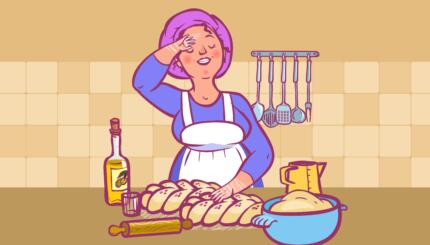Ladino first cast its magic spell on me in childhood. It always struck me as a graceful, rolling language, one of emotion and longing, filled with desire. It was a secret language that my mother spoke with her mother, my grandmother, of blessed memory. My grandmother immigrated to Israel from Bulgaria, arriving as Ladino-speaking Tanya and eventually becoming Hebrew-speaking Shoshana. But when my mother and grandmother wanted to speak without us girls understanding, they spoke Ladino. And so Ladino took root for me as the language of women.
In 2004 I founded the Israeli Ethnic Ensemble, which appears around the world with a rich and fascinating program of Sephardic music. Sephardic musical culture has been preserved for hundreds of years. Ladino songs originated in the 9th-13th centuries, when Jewish life flourished in Spain. It continued to develop after the expulsion of Jews from Spain in 1492. And it is this music that inspires me and my ensemble.
As a professional, delving into magical musical materials preserved in Ladino, I discovered that the preservation of this tradition by women was not unique to my family. When the Jews were expelled from Spain and spread across Turkey, Greece, Bulgaria, Morocco, etc., it was the men who worked outside the home, mingling with the locals and the language of the place. By contrast women rarely left their homes, did not integrate into the local population and continued to exclusively or dominantly speak Ladino. Women continued to create songs and melodies in Ladino expressing their feelings, difficulties, joys and grief. The vast majority of Ladino songs are songs “feminine;” wedding songs, lullabies, love songs, etc. Through women, the language has been preserved as it was spoken centuries ago.
One of the historic Jewish centers in Spain was in Cordoba. Moses Maimonides, one of the most influential Jewish thinkers of all time, was born there circa 1135. But he left, as Muslim rule made Jewish life difficult. Later Christians ruled the city and in the 15th century the Jews of Cordoba were expelled or forced to convert along with their fellow co-religionists. So it was particularly meaningful when the Israeli Ethnic Ensemble was invited by the City of Cordoba to appear in the 13th International Sephardic Jewish Music Festival in Spain.
We arrived in Cordoba late at night. Our group of passionate Israeli musicians includes Gilad Ephrat on double bass, Idan Toledano on guitar and oud, the violinist Chen Shenhar and myself singing the vocals. We woke in the morning and set out to discover this warm, sleepy town. We went to the Old City in search of the statue of Maimonides. We had heard about the blessing and good fortune that befalls those who touch the feet of the statue and pay tribute to the great scholar. A short tour of the alleys of Cordoba’s Old City taught us that the current vibrancy of the modern municipality is tied to the ancient culture and heritage left by our ancestors when they were expelled. It was amazing to see intense tourist activity in the Old City. The statue of Maimonides is a focal point of an attractive tourist center. The municipality of Cordoba has already embarked on an extensive public relations campaign and refurbishment of the Jewish synagogue to be completed in 2015 on the 700th anniversary of its founding.
The International Sephardic Festival which takes place every year in June is one of the city’s main music events. For the last 13 years, Spain has hosted musicians from around the world. This year, the beautiful botanical gardens were the site for six days of performances from Spain, Poland, Portugal and Israel. After visiting the Old City and the dark, horrifying museum of the Holy Inquisition, we headed towards the botanical gardens where the festival was to be held. There was a wine tasting workshop, followed by the opening act of the festival. The transition to the pastoral calm of the setting and the beautiful music was jarring, but we had come for a short visit to a city with a glorious but troubled past and it could not have been otherwise.
Sephardic
Pronounced: seh-FAR-dik, Origin: Hebrew, describing Jews descending from the Jews of Spain.



